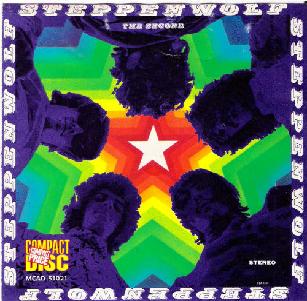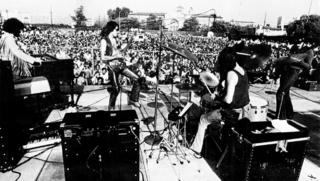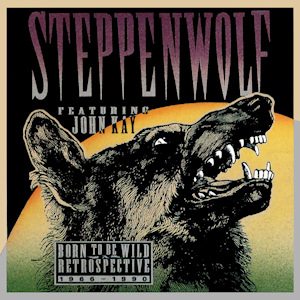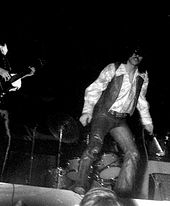
Steppenwolf was a Canadian-American rock band that was prominent from 1968 to 1972. The group was formed in late 1967 in Los Angeles by lead singer John Kay, keyboardist Goldy McJohn, and drummer Jerry Edmonton, all formerly of the Canadian band the Sparrows. Guitarist Michael Monarch and bass guitarist Rushton Moreve were recruited via notices placed in Los Angeles-area record and musical instrument stores.

"Born to Be Wild" is a song written by Mars Bonfire and first performed by the band Steppenwolf. It is often invoked in both popular and counter culture to denote a biker appearance or attitude. It is most notably featured in the 1969 film Easy Rider. Sometimes, "Born to Be Wild" is described as the first heavy metal song, and the second-verse lyric "heavy metal thunder" marks the first use of this term in rock music.

"Magic Carpet Ride" is a rock song written by John Kay and Rushton Moreve from the Canadian-American hard rock band Steppenwolf. The song was initially released in 1968 on the album The Second. It was the lead single from that album, peaking at number three in the US, and staying in the charts for 16 weeks, longer than any other Steppenwolf song.

Rock music of Canada is a wide and diverse part of the general music of Canada, beginning with American and British style rock and roll in the mid-20th century. Since then Canada has had a considerable impact on the development of the modern popular music called rock. Canada has produced many of the genre's most significant groups and performers, while contributing substantively to the development of the most popular subgenres, which include pop rock, progressive rock, country rock, folk rock, hard rock, punk rock, heavy metal and indie rock.

Gerald Michael Edmonton was a Canadian musician who was the drummer and secondary lead vocalist for the rock band Steppenwolf.

Nick St. Nicholas is a German bandleader, bass guitarist, singer and songwriter; best known for his partnership in Steppenwolf.

The Second is the second studio album by Canadian-American rock band Steppenwolf, released in October 1968 on ABC Dunhill Records. The album contains one of Steppenwolf's most famous songs, "Magic Carpet Ride". The background of the original ABC LP cover was a shiny "foil", in contrast to later LP issues and the modern CD sleeve.

Steppenwolf Live is primarily a collection of recordings from a single concert early in 1970 at the Santa Monica Civic Auditorium by Steppenwolf staged in support of their 1969 album Monster. Released in April 1970 by Dunhill Records, it contains Steppenwolf's well-known hits: "Born to Be Wild", "Magic Carpet Ride" and "The Pusher", as well as most of the songs from Monster, including three previous top 40 hits, as well as the top 40 hit "Hey Lawdy Mama" from this album.

16 Greatest Hits is a compilation album by Steppenwolf, released in 1973. It features some of their most famous songs, including "Born to Be Wild", "The Pusher", and "Magic Carpet Ride", and "Hey Lawdy Mama." The album consisted of the 11 tracks from the previous Gold: Their Great Hits album, in the same order as on the two sides of that earlier album, with the addition of the final two tracks on side 1, and the final three tracks on side 2.
Rushton Moreve was an American bass guitarist best known for his work with the rock band Steppenwolf from 1967 to 1968 and again in 1978. According to singer John Kay, he was an intuitive bassist with a melodic style that brought a non-commercial sound to the band, a technique exemplified on the hit he co-wrote with Kay, "Magic Carpet Ride".
The Sparrows was a Canadian blues rock band of the 1960s. Notable for being the first group to bring musician John Kay into the mainstream, the Sparrows later morphed into the popular heavy rock group Steppenwolf.

Gold: Their Great Hits is a greatest hits album released by the Canadian-American hard rock band Steppenwolf. The album, released in 1971, charted at #24 on the Billboard Pop Albums charts and was certified "gold" by the RIAA on April 12, 1971. Initial pressings of the album came in a gatefold sleeve, with a detachable poster of the band.

The discography of Steppenwolf, a Canadian-American Hard rock band, consists of 13 studio albums, 14 compilation albums, 5 41 singles, and three music videos. The band was formed in 1967 after some members of The Sparrows split. Group members included John Kay, Michael Monarch, Goldy McJohn, Rushton Moreve and Jerry Edmonton. Their first album, Steppenwolf, was released in 1968, which sold well and reached 6 on Billboard. That same year, Steppenwolf covered "The Pusher". The song was later used in Easy Rider. The album's most successful single was "Born to Be Wild", which reached No. 2 on the Billboard. At the time of the release of second album, The Second, the band's bassist Rushton Moreve had a dispute with band leader John Kay, and was eventually replaced with Nick St. Nicholas. The album's single was "Magic Carpet Ride" which reached number 3 on Billboard.
Gabriel Mekler was an American songwriter, musician, and record producer who attained fame in the 1960s, helming albums for Steppenwolf, Three Dog Night, and Janis Joplin. He also collaborated with R&B singer Etta James for two critically acclaimed albums in the early 1970s, mixing blues, soul, and then topped it off with Genya Ravan production jazz and rock.

Born to Be Wild – A Retrospective is a 1991 greatest hits album by Steppenwolf. It was the first attempt at a serious historical overview of the band and its founder/leader's career.

John Raymond Goadsby, known as Goldy McJohn, was a Canadian keyboard player best known as the original keyboardist for rock group Steppenwolf. Originally a classically trained pianist, he was a pioneer in the early use of the electronic organ in heavy metal.
"Rock Me" is a song by the Canadian-American hard rock band Steppenwolf. It was released on their 1969 album At Your Birthday Party. It was written by the band's lead singer John Kay, and was the band's fifth American single release. The song was produced by Gabriel Mekler and released as a single in 1969, originally as the B-side to "Jupiter Child", but the sides were later flipped. It peaked at #10 on the Hot 100 on April 19, 1969 and #6 on both WLS and WCFL. It was both Billboard's and Cashbox's top debut the week of March 1, 1969. The song is considered the highlight of the album though it had been released for the soundtrack well ahead of the album. The song followed on the heels of the band's two 1968 hits, "Born to Be Wild" which peaked at #2 and "Magic Carpet Ride" which peaked at #3. Cash Box particularly praised the "pulverizing vocal performance."
Ron Hurst is an American musician. Since 1984 he has been the drummer for American rock band Steppenwolf. He resides in Hillsboro, Oregon, in the Portland area where he teaches drums at a studio. Hurst moved from Nashville, Tennessee, to the Hillsboro area in 2003. He grew up in Holyoke, Massachusetts before moving to New York City and Nashville. His daughter is in a band called In Retrograde. In addition to drums, he has also done vocal work with the band.














